| Listing 1 - 10 of 10 |
Sort by
|
Book
ISBN: 9781409438854 9781409438861 9781409472582 Year: 2013 Publisher: Farnham Ashgate
Abstract | Keywords | Export | Availability | Bookmark
 Loading...
Loading...Choose an application
- Reference Manager
- EndNote
- RefWorks (Direct export to RefWorks)
Human rights --- Criminal law. Criminal procedure --- Reparations for historical injustices --- Transitional justice --- Justice --- Redress for historical injustices --- Reparation for historical injustices --- Reparations --- Reparations for past injustices --- Restitution for historical injustices --- Indemnity --- Social justice
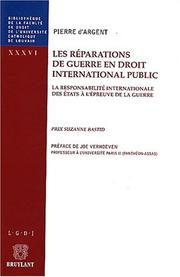
ISBN: 2802715933 2275022449 9782802715931 Year: 2002 Volume: 36 Publisher: Bruxelles Bruylant
Abstract | Keywords | Export | Availability | Bookmark
 Loading...
Loading...Choose an application
- Reference Manager
- EndNote
- RefWorks (Direct export to RefWorks)
L'Etat qui viole la règle fondamentale du droit des gens interdisant de recourir à la force armée dans les relations internationales est-il tenu de réparer les dommages qui résultent de son fait illicite ? A quelles conditions ? Dans quelle mesure ?
Law of armed conflicts. Humanitarian law --- War damage compensation --- War reparations --- Government liability --- International obligations --- Dommages de guerre --- Réparations de guerre --- Etat --- Obligations internationales --- Indemnités --- Responsabilité --- Reparations for historical injustices. --- War damage compensation. --- Government liability (International law) --- 341.384 --- Oorlogsschade. Oorlogsschulden --- 341.384 Oorlogsschade. Oorlogsschulden --- Réparations de guerre --- Indemnités --- Responsabilité --- Reparations for historical injustices --- War damage insurance --- Insurance --- Redress for historical injustices --- Reparation for historical injustices --- Reparations --- Reparations for past injustices --- Restitution for historical injustices --- Indemnity --- Social justice --- International claims --- International law --- Sovereignty --- Claims --- État --- Guerre (droit international)
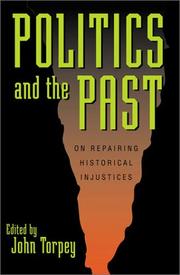
ISBN: 0742517985 0742517993 9780742517998 Year: 2003 Publisher: Lanham, Md Rowman & Littlefield
Abstract | Keywords | Export | Availability | Bookmark
 Loading...
Loading...Choose an application
- Reference Manager
- EndNote
- RefWorks (Direct export to RefWorks)
Politics --- History as a science --- Intergenerational relations. --- Ethnic relations. --- Restorative justice. --- Relations entre générations --- Relations interethniques --- Justice réparatrice --- Reparations for historical injustices. --- Relations entre générations --- Justice réparatrice --- Ethnic relations --- Intergenerational relations --- Reparations for historical injustices --- Restorative justice --- Balanced and restorative justice --- BARJ (Restorative justice) --- Community justice --- Restorative community justice --- Criminal justice, Administration of --- Reparation (Criminal justice) --- Redress for historical injustices --- Reparation for historical injustices --- Reparations --- Reparations for past injustices --- Restitution for historical injustices --- Indemnity --- Social justice --- Intergenerational relationships --- Relations, Intergenerational --- Relationships, Intergenerational --- Interpersonal relations --- Inter-ethnic relations --- Interethnic relations --- Relations among ethnic groups --- Acculturation --- Assimilation (Sociology) --- Ethnic groups --- Ethnology --- Social problems --- Sociology --- Minorities --- Race relations
Book
ISBN: 9780199235605 Year: 2008 Publisher: Oxford Oxford University Press
Abstract | Keywords | Export | Availability | Bookmark
 Loading...
Loading...Choose an application
- Reference Manager
- EndNote
- RefWorks (Direct export to RefWorks)
Human rights --- Peaceful settlement of international disputes --- Indigenous peoples (International law) --- Reparations for historical injustices --- Indigenous peoples --- Autochtones --- Réparations des crimes de l'histoire --- Civil rights --- Legal status, laws, etc --- Cross-cultural studies --- Droit international --- Droits --- Droit --- Etudes transculturelles --- Reparations for historical injustices. --- Legal status, laws, etc. --- Reparations. --- Indigenous peoples (International law). --- Réparations des crimes de l'histoire --- Redress for historical injustices --- Reparation for historical injustices --- Reparations --- Reparations for past injustices --- Restitution for historical injustices --- Indemnity --- Social justice --- Aboriginal peoples --- Aborigines --- Adivasis --- Indigenous populations --- Native peoples --- Native races --- Ethnology --- International law --- Cross-cultural studies.
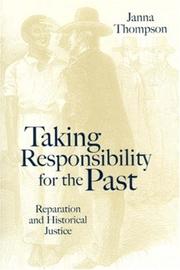
ISBN: 0745628850 0745628842 9780745628851 9780745628844 Year: 2002 Publisher: Cambridge Polity
Abstract | Keywords | Export | Availability | Bookmark
 Loading...
Loading...Choose an application
- Reference Manager
- EndNote
- RefWorks (Direct export to RefWorks)
Reparations for historical injustices. --- Intergenerational relations. --- Restorative justice. --- 177.9 --- 241.65 --- Balanced and restorative justice --- BARJ (Restorative justice) --- Community justice --- Restorative community justice --- Criminal justice, Administration of --- Reparation (Criminal justice) --- Intergenerational relationships --- Relations, Intergenerational --- Relationships, Intergenerational --- Interpersonal relations --- Redress for historical injustices --- Reparation for historical injustices --- Reparations --- Reparations for past injustices --- Restitution for historical injustices --- Indemnity --- Social justice --- Rechtvaardigheid. Diefstal. Bedrog --- Theologische ethiek: rechtvaardigheid--(zie ook {330.86}) --- 241.65 Theologische ethiek: rechtvaardigheid--(zie ook {330.86}) --- 177.9 Rechtvaardigheid. Diefstal. Bedrog --- Intergenerational relations --- Reparations for historical injustices --- Restorative justice --- Political philosophy. Social philosophy
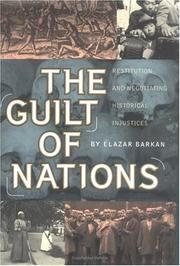
ISBN: 0393048861 Year: 2000 Publisher: New York, N.Y. Norton
Abstract | Keywords | Export | Availability | Bookmark
 Loading...
Loading...Choose an application
- Reference Manager
- EndNote
- RefWorks (Direct export to RefWorks)
History --- Human rights --- International relations --- Minorities --- Political ethics --- Postcolonialism --- Reparations for historical injustices --- Restorative justice --- Balanced and restorative justice --- BARJ (Restorative justice) --- Community justice --- Restorative community justice --- Criminal justice, Administration of --- Reparation (Criminal justice) --- Redress for historical injustices --- Reparation for historical injustices --- Reparations --- Reparations for past injustices --- Restitution for historical injustices --- Indemnity --- Social justice --- Post-colonialism --- Postcolonial theory --- Political science --- Decolonization --- Ethics, Political --- Ethics in government --- Government ethics --- Politics, Practical --- Ethics --- Civics --- Ethnic minorities --- Foreign population --- Minority groups --- Persons --- Assimilation (Sociology) --- Discrimination --- Ethnic relations --- Majorities --- Plebiscite --- Race relations --- Segregation --- History, Modern --- Philosophy --- Moral and ethical aspects --- #A0102A --- International relations. Foreign policy --- Law of armed conflicts. Humanitarian law
Book
ISBN: 1282401041 9786612401046 9047427955 9789047427957 9789004174498 9004174494 9781282401044 6612401044 Year: 2009 Publisher: Leiden Nijhoff
Abstract | Keywords | Export | Availability | Bookmark
 Loading...
Loading...Choose an application
- Reference Manager
- EndNote
- RefWorks (Direct export to RefWorks)
This book provides detailed analyses of systems that have been established to provide reparations to victims of genocide, crimes against humanity and war crimes, and the way in which these systems have worked and are working in practice. Many of these systems are described and assessed for the first time in an academic publication. The publication draws upon a groundbreaking Conference organised by the Clemens Nathan Research Centre (CNRC) and REDRESS at the Peace Palace in The Hague, with the support of the Dutch Carnegie Foundation. Both CNRC and REDRESS had become very concerned about the extreme difficulty encountered by most victims of serious international crimes in attempting to access effective and enforceable remedies and reparation for harm suffered. In discussions between the Conference organisers and Judges and officials of the International Criminal Court, it became ever more apparent that there was a great need for frank and open exchanges on the question of effective reparation, between the representatives of victims, of NGOs and IGOs, and other experts. It was clear to all that the many current initiatives of governments and regional and international institutions to afford reparations to victims of genocide, crimes against humanity and war crimes could benefit greatly by taking into full account the wide and varied practice that had been built up over several decades. In particular, the Hague Conference sought to consider in detail the long experience of the Conference on Jewish Material Claims against Germany (the Claims Conference) in respect of Holocaust restitution programmes, as well as the practice of truth commissions, arbitral proceedings and a variety of national processes to identify common trends, best practices and lessons. This book thus explores the actions of governments, as well as of national and international courts and commissions in applying, processing, implementing and enforcing a variety of reparations schemes and awards. Crucially, it considers the entire complex of issues from the perspective of the beneficiaries - survivors and their communities - and from the perspective of the policy-makers and implementers tasked with resolving technical and procedural challenges in bringing to fruition adequate, effective and meaningful reparations in the context of mass victimisation.
Genocide --- Reparations for historical injustices --- War reparations --- Redress for historical injustices --- Reparation for historical injustices --- Reparations --- Reparations for past injustices --- Restitution for historical injustices --- Indemnity --- Social justice --- Reparations, War --- Cleansing, Ethnic --- Ethnic cleansing --- Ethnic purification --- Ethnocide --- Purification, Ethnic --- Crime --- Economic aspects --- Law and legislation --- Restorative justice --- Crimes against humanity --- Génocide --- Réparations de guerre --- Réparations des crimes de l'histoire --- Justice réparatrice --- Crimes contre l'humanité --- Aspect économique --- Law of armed conflicts. Humanitarian law --- Human rights --- Criminology. Victimology --- Génocide --- Réparations des crimes de l'histoire --- Crimes contre l'humanité --- Dommages de guerre --- Droit humanitaire --- Guerre mondiale (1939-1945) --- Juifs --- Aspect économique --- Indemnités --- Confiscations et contributions --- Persécutions
Book
ISBN: 9781780684031 9781780685267 Year: 2016 Volume: 21 Publisher: Cambridge Intersentia
Abstract | Keywords | Export | Availability | Bookmark
 Loading...
Loading...Choose an application
- Reference Manager
- EndNote
- RefWorks (Direct export to RefWorks)
How do societies at the national and international level try to overcome historical injustices? What remedies did they develop to do justice to victims of large scale atrocities? And even more important: what have we learned from the implementation of these so-called instruments of transitional justice in practice? Lawyers, socials scientists and historians have published shelves full of books and articles on how to confront the past through international criminal tribunals, truth commissions, financial compensation schemes and other instruments of retributive/punitive and restorative justice. A serious problem continues to be that broad interdisciplinary accounts that include both categories of measures are still hardly available. With this volume a group of international experts in the field endeavors to fill this gap, and even more. By alternating historical overviews with critical assessments this volume does not only offer an extensive introduction to the world of transitional justice, but also food for thought concerning the effectiveness of the remedies it offers to face the past successfully --Back cover
Law of armed conflicts. Humanitarian law --- Legal theory and methods. Philosophy of law --- Réparations des crimes de l'histoire --- Justice transitionnelle --- BARJ (Restorative justice) --- Balanced and restorative justice --- Community justice --- Compensaties voor historische onrechtvaardigheden --- Crimes contre l'histoire [Réparations des ] --- Justice restaurative --- Justice restauratrice --- Justice réconciliatrice --- Justice réparatrice --- Redress for historical injustices --- Reparation for historical injustices --- Reparations for historical injustices --- Reparations for past injustices --- Restauratieve rechtvaardigheid --- Restitution for historical injustices --- Restorative community justice --- Restorative justice --- Réparation des crimes contre l'histoire --- Réparations des injustices de l'histoire --- Réparations des injustices du passé --- Réparations des préjudices de l'histoire --- Réparations pour des injustices historiques --- Schadeloosstellingen voor historische onrechtvaardigheden --- International courts --- History --- Réparations des crimes de l'histoire. --- Justice transitionnelle.
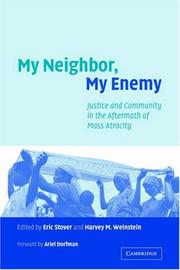
ISBN: 0521542642 0521834953 9780521542647 9780521834957 9780511720352 0511720351 Year: 2004 Publisher: Cambridge Cambridge University Press
Abstract | Keywords | Export | Availability | Bookmark
 Loading...
Loading...Choose an application
- Reference Manager
- EndNote
- RefWorks (Direct export to RefWorks)
My Neighbour, My Enemy tackles a crucial and highly topical issue - how do countries rebuild after ethnic cleansing and genocide? And what role do trials and tribunals play in social reconstruction and reconciliation. By talking with people in Rwanda and the former Yugoslavia and carrying out extensive surveys, the authors explore what people think about their past and the future. Their conclusions controversially suggest that international or local trials have little relevance to reconciliation. Communities understand justice far more broadly than it is defined by the international community and the relationship of trauma to a desire for trials is not clear-cut. The authors offer an ecological model of social reconstruction and conclude that coordinated multi-systemic strategies must be implemented if social repair is to occur. Finally, the authors suggest that while trials are essential to combat impunity and punish the guilty, their strengths and limitations must be acknowledged.
Genocide --- International criminal courts --- Reparations for historical injustices --- Retribution --- Social justice --- War crimes --- #SBIB:327.5H21 --- #SBIB:340H86 --- #SBIB:340H88 --- Crime --- Equality --- Justice --- Social exchange --- Punishment --- Revenge --- Redress for historical injustices --- Reparation for historical injustices --- Reparations --- Reparations for past injustices --- Restitution for historical injustices --- Indemnity --- Criminal courts --- International courts --- Complementarity (International law) --- Cleansing, Ethnic --- Ethnic cleansing --- Ethnic purification --- Ethnocide --- Purification, Ethnic --- Vrede – oorlog, oorlogssituaties --- Internationaal recht: bijzondere vraagstukken: individu - volkenrecht --- Internationaal recht: rechten van de mens --- Sociology of law --- Criminology. Victimology --- War crimes. --- Genocide. --- International criminal courts. --- Reparations for historical injustices. --- Social justice. --- Crimes de guerre --- Génocide --- Tribunaux criminels internationaux --- Réparations des crimes de l'histoire --- Justice sociale --- Health Sciences --- Psychiatry & Psychology --- Retribution.
Multi
ISBN: 9780521760867 9781139187671 1139187678 9781139190268 1139190261 0521760860 9780521149808 0521149800 9781139003650 1107216567 1139179365 1283378086 9786613378088 113918895X 1139003658 1139183044 1139185365 Year: 2011 Publisher: Cambridge Cambridge University Press
Abstract | Keywords | Export | Availability | Bookmark
 Loading...
Loading...Choose an application
- Reference Manager
- EndNote
- RefWorks (Direct export to RefWorks)
"In this book, philosopher David Boonin attempts to answer the moral questions raised by five important and widely contested racial practices: slave reparations, affirmative action, hate speech restrictions, hate crime laws, and racial profiling. Arguing from premises that virtually everyone on both sides of the debates over these issues already accepts, Boonin arrives at an unusual and unorthodox set of conclusions, one that is neither liberal nor conservative, color conscious nor color blind. Defended with the rigor that has characterized his previous work but written in a more widely accessible style, this provocative and important new book is sure to spark controversy and should be of interest to philosophers, legal theorists, and anyone interested in trying to resolve the debate over these important and divisive issues"--
Political philosophy. Social philosophy --- Sociology of minorities --- Affirmative action programs --- Hate crimes --- Race relations --- Reparations for historical injustices --- Slavery --- Abolition of slavery --- Antislavery --- Enslavement --- Mui tsai --- Ownership of slaves --- Servitude --- Slave keeping --- Slave system --- Slaveholding --- Thralldom --- Crimes against humanity --- Serfdom --- Slaveholders --- Slaves --- Redress for historical injustices --- Reparation for historical injustices --- Reparations --- Reparations for past injustices --- Restitution for historical injustices --- Indemnity --- Social justice --- Integration, Racial --- Race problems --- Race question --- Relations, Race --- Ethnology --- Social problems --- Sociology --- Ethnic relations --- Minorities --- Racism --- Bias crimes --- Bias-related crimes --- Hate-motivated crimes --- Hate offenses --- Crime --- Equal employment opportunity --- Equal opportunity in employment --- Personnel management --- Discrimination in employment --- Employment --- Race relations. --- Slavery. --- Reparations for historical injustices. --- Affirmative action programs. --- Hate crimes. --- Arts and Humanities --- Philosophy --- Enslaved persons
| Listing 1 - 10 of 10 |
Sort by
|

 Search
Search Feedback
Feedback About UniCat
About UniCat  Help
Help News
News